2 Priorities
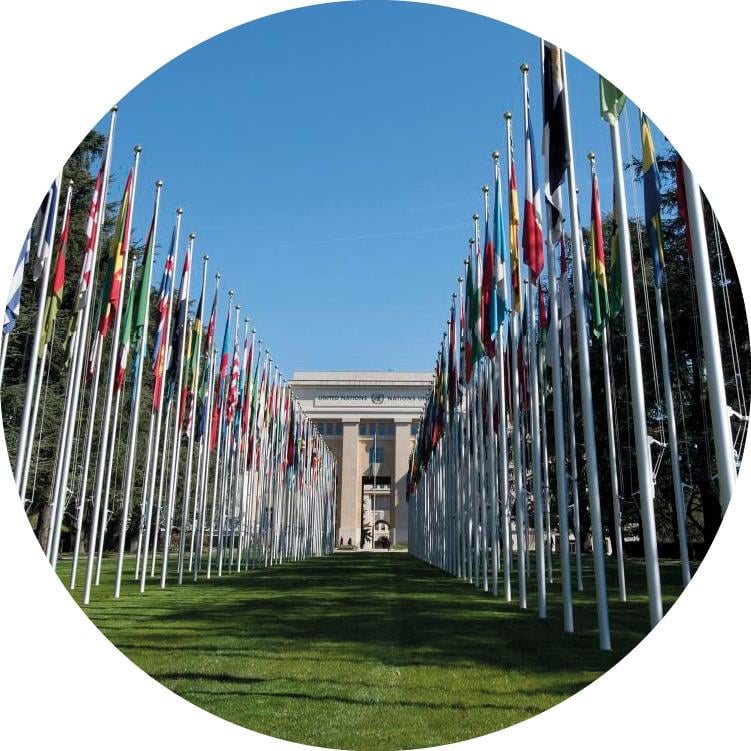
The European headquarters of the United Nations in Genève: The Palais des Nations
Photo: UN Photo / Jean-Marc Ferré.
Norway has three main priorities during the term on the EB; governance, universal health coverage and preparedness and response to health crises.
The three priorities are underpinned by the following aims and objectives:
- Good governance: Improve the way in which WHO is managed and funded. The focus will be on efficient governance, an improved organisational culture and more sustainable funding, so that the organisation can meet its objectives in the best possible way and carry out its mandate as an actor in the fields of norms and standards, global cooperation, development and humanitarian work.
- Achieve universal health coverage: Provide support to WHOs work to coordinate action for stronger, sustainable and resilient national health systems. The aim is to ensure fair and equitable access to affordable essential health services for all. Particular attention will be given to the establishment of robust primary healthcare with integrated services.
- Better preparedness and response to health and humanitarian crisis: Strengthen global efforts on infectious disease outbreaks including pandemics, and ensure access to essential health services in humanitarian crises.

Governance Illustration
Photo: Colourbox
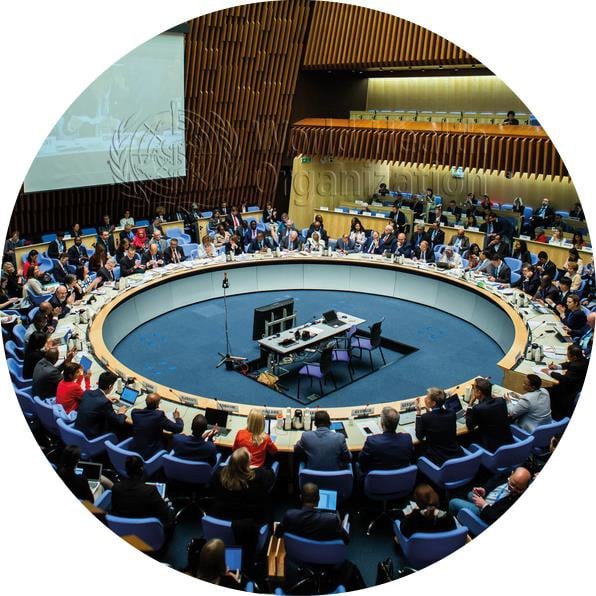
Executive Board Meeting of the World Health Organization
Photo: WHO / Pierre Albouy
2.1 Good governance
Aims and objectives: Improve the way in which WHO is managed and funded. The focus will be on efficient governance, an improved organisational culture and more sustainable funding, so that the organisation can meet its objectives in the best possible way and carry out its mandate as an actor in the fields of norms and standards, global cooperation, development and humanitarian work.
2.1.1 Background
WHO is run by its 194 Member States following the same principle as other UN organisations: each country has one vote. WHO is governed through meetings of its decision-making body, the World Health Assembly (WHA). The world’s health ministers meet at the annual WHA in Geneva to approve the WHO’s strategic plans and programme budgets, and to adopt resolutions. Together, these establish WHO’s mandate and set political and technical guidelines for its work. WHO has a strong tradition of adopting decisions by consensus.
WHO’s Executive Board is composed of members from 34 Member States and represents WHO’s six regions. The term of each member on the EB is three years. The main function of the Executive Board is to facilitate the work of the WHA and ensure implementation of its decisions. Board meetings are held twice a year, in January/February and immediately after the WHA in May/June. The Executive Board can set up committees, such as the Programme, Budget and Administration Committee (PBAC), which Norway is chairing from June 2024 to June 2025.
The WHO Secretariat is organised on three levels: global, regional and country level. The four-year General Programme of Work (GPW), lays down the overall framework for WHO’s activities and forms the basis of the two-year programme budgets which are discussed by the Board and adopted by the WHA. The Executive Board is kept informed on progress through internal reports from the Secretariat, including annual reports from the oversight bodies and external evaluations through the UN’s Joint Inspection Unit (JIU) and the Multilateral Organisation Performance Assessment Network (MOPAN), among others 1 .
WHO is partly funded by its Member States in the form of assessed contributions which are calculated based on a country’s gross domestic product (GDP). The percentage is set at the WHA every two years. Although assessed contributions have provided flexible and predictable funding over the years, today they cover less than 20 percent of WHO’s total budget. The remaining 80 % is funded by voluntary, but often earmarked, contributions from Member States, private foundations, global health initiatives, funds and other organisations. This funding model reduces financial predictability and generates a heavy reporting burden, due to the many separate agreements, and too much time being spent on resource mobilisation. It ultimately challenges WHO’s democratic principle and its role as a leading actor in global health.
As part of the UN system and on the initiative of the WHO’s Executive Board, the organisation has been undergoing several reforms. Accountability, more transparency, compliance and efficiency are priority areas. The objective is to improve management and governance, optimise the use of resources, facilitate better results, improve trust and strengthen the organisation’s reputation. These are key focus areas for Norway.
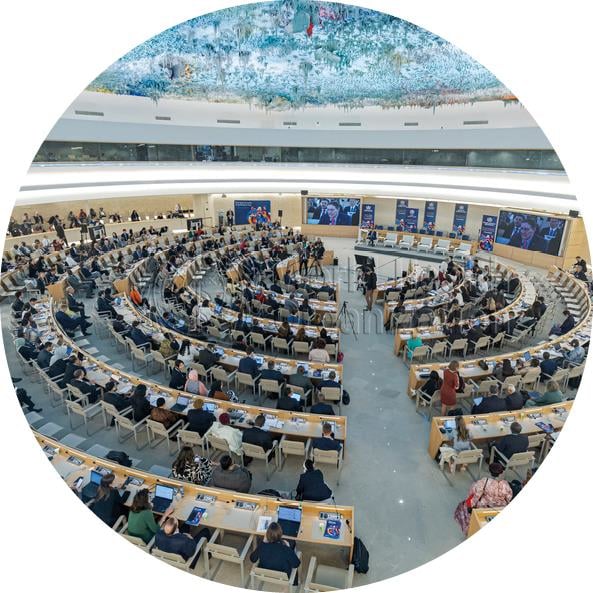
World Health Assembly Meeting in Palais des Nations/the Palace of Nations
Photo: WHO / Antoine Tardy
2.1.2 Priorities
More efficient and accountable governance
As a member of the Executive Board, Norway will work to ensure that WHO is an efficient and reputable organisation. Norway will support improvements in the management of WHO by Member States and the Secretariat. Key focus areas are ensuring more sustainable funding and supporting ongoing reforms to improve transparency and accountability, as well as better risk management, oversight, and ensuring that the organization upholds its ethical obligation in all its work. This includes ensuring good financial and resource management, and prevention of fraud and corruption.
As a member of the Executive Board, Norway will work towards:
- Greater accountability among WHO’s Member States through clearer commitments to sustainable and more flexible funding, respect for priorities adopted through the work programme, and restraint in launching new initiatives and resolutions, for example, through planned resource allocation for ongoing programmes to ensure sustainable implementation, including monitoring and oversight.
- Enhancing transparency and accountability in the organisation’s prioritisation and decision-making processes, including budgeting.
- Better internal organisation of the fields of technical expertise, improving coherence between the organisation’s funding, goals and results, and avoiding work in silos.
- More easily understandable reporting of the relationship between resource use and results, at all levels.
- Ensuring that the decision to increase the proportion of assessed contributions is followed by additional funding through the Investment Round to secure more sustainable funding across WHO’s functions.
- Ensuring that accountability and integrity are sufficiently prioritised at all three levels of the organisation, in line with the general context and risk assessment.
Better organisational culture
During WHO’s Ebola response operations in the Democratic Republic of the Congo between 2018 and 2020, a sexual abuse scandal was exposed. The leadership’s handling of the scandal made it clear that risk management and a holistic and systemic approach to ensure ethical practice need to be prioritised at all levels of the organisation. Measures are needed to improve the organisation’s culture and to ensure a safe and respectful workplace, free from inappropriate behaviour. Good working conditions are essential if WHO is to achieve its desired results. Also, taking the right steps can reduce reputational risk.
As a member of the Executive Board, Norway will:
- Communicate clear requirements and expectations for the further strengthening of efforts to build a trust-based culture, and to prevent and respond to sexual exploitation, abuse, harassment, and other forms of inappropriate behaviour such as discrimination, abuse of power, fraud, and corruption.
Better organisation of humanitarian efforts
WHO is a humanitarian actor. When crises arise, the organisation must respond quickly and efficiently, in cooperation with its partners. In major humanitarian crises, a «health cluster» structure is established at the country level, to ensure good coordination and prevent gaps and overlaps in the humanitarian response. Close coordination and cooperation among all parties are vital to the protection and assistance of those in need.
As a member of the Executive Board, Norway will:
- Continue Norway’s humanitarian approach of being a reliable and flexible donor, so that WHO and its partners can quickly respond to changing humanitarian needs.
- Follow WHO’s implementation of The Grand Bargain 2 and other reform obligations for effective humanitarian efforts.
- Monitor the UN reform on comprehensive response and WHO’s contribution, to improve the interaction between humanitarian work and development policy in the health sector.
Reducing the organisation’s climate footprint
In recent years, the international climate research community has been calling attention to the need for all parts of society to be involved in achieving climate change goals. At the same time, the effects of climate change on public health and health service delivery have become more apparent. WHO has taken a clearer position in emphasising the connection between climate and health and will incorporate effort on climate across all areas.
As a member of the Executive Board, Norway will:
- Ensure that the climate footprint of WHO’s own actions is examined across all three levels of the organisation to limit greenhouse gas emissions from WHO activities.
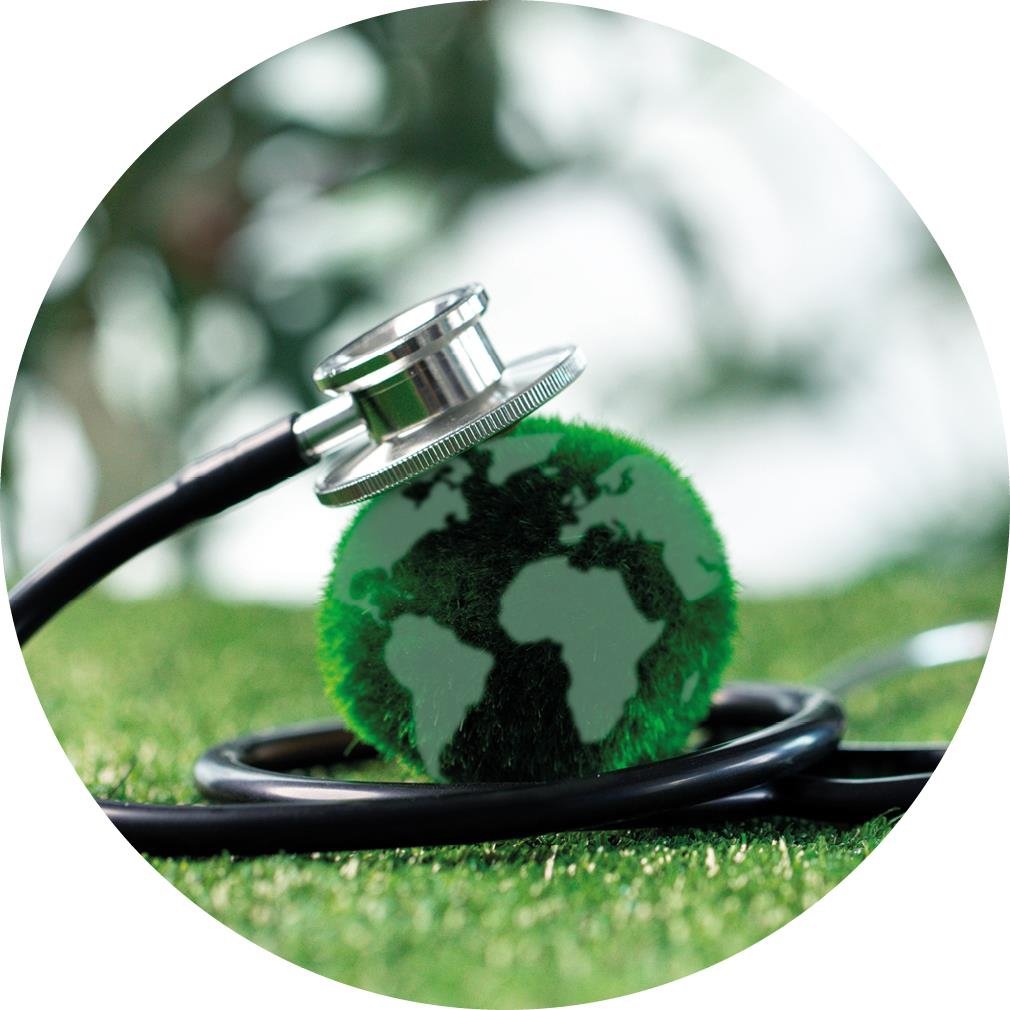
Climate Change and Health
Photo: Colourbox
2.2 Achieving universal health coverage
Aims and objectives: Provide support to WHOs work to coordinate action for stronger, sustainable and resilient national health systems. The aim is to ensure fair and equitable access to affordable essential health services for all. Particular attention will be given to the establishment of robust primary healthcare with integrated services.
2.2.1 Background
One of the fundamental arguments for universal health coverage (UHC) is the basic right to health for all, which is also pivotal in safeguarding other human rights 3 . SDG 3.8 sets a target for UHC by 2030, including financial risk protection, access to quality essential health-care services and access to safe, effective, and affordable essential medicines and vaccines for all.

Baby Health Check
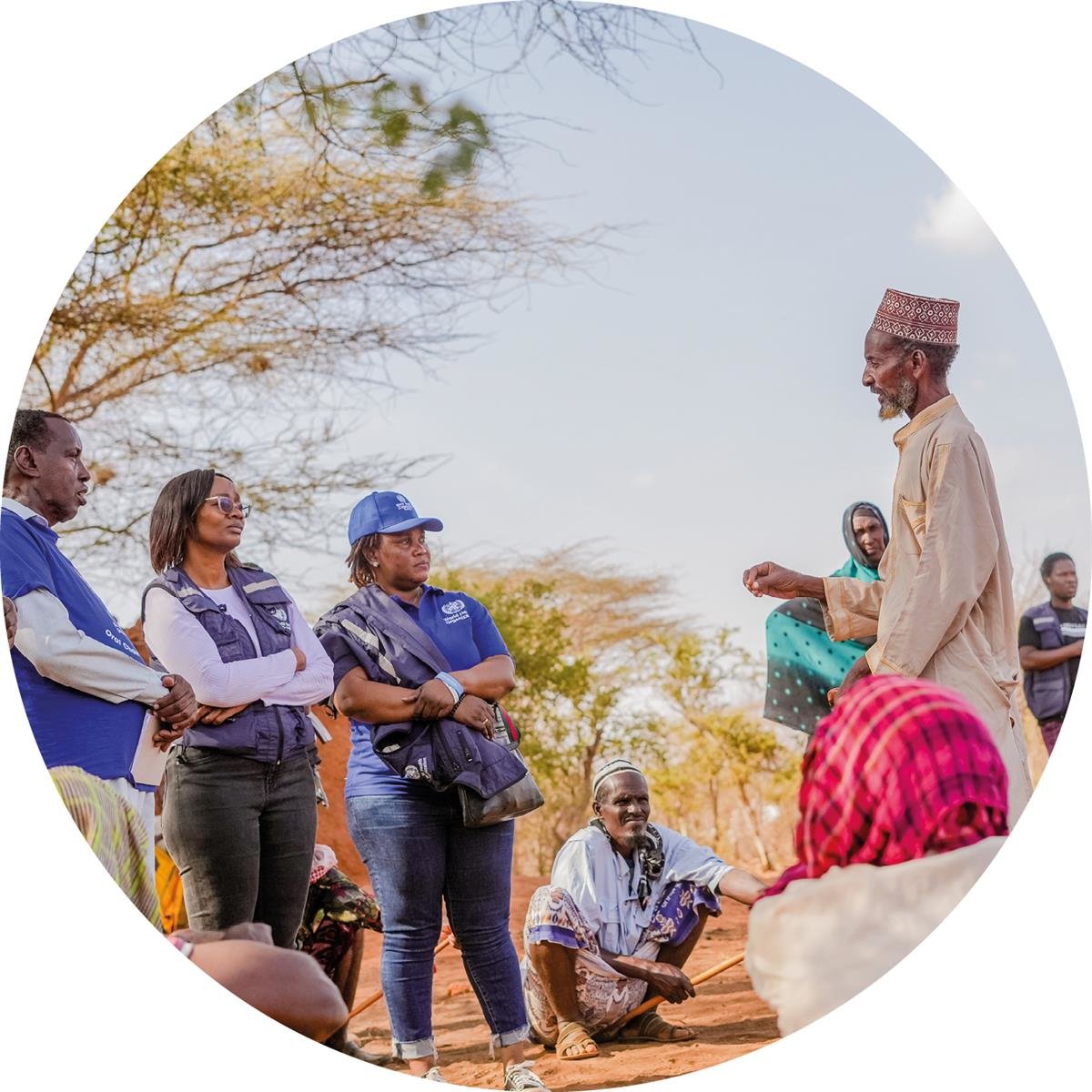
Health Promotion in Kenya
Photo: WHO / Billy Miaron
WHO’s definition of UHC is all people having access to the full range of quality health services they need, when and where they need them, without facing financial hardship. This includes prevention, treatment and rehabilitation. The world is not on track to reach the UHC target by 2030. Progress in healthcare coverage has stagnated since 2015, and the proportion of the world’s population facing catastrophic healthcare costs has increased, largely due to the economic and health consequences of the COVID-19 pandemic. 4
All countries have to prioritise resources according to local conditions and needs. At the same time, the goal should be to realize people’s right to health, and to achieve the best possible health for all people, on the basis of equity, openness and inclusion. The most effective way to achieve cost-effectiveness and equitable access is through investment in primary healthcare (PHC). PHC can deliver 90 % of the health measures needed to attain UHC 5 .
Much of the global effort in health over the last 30 years has been directed towards disease-specific initiatives. However, the pandemic and climate crisis have underscored the need to build robust and comprehensive PHC services that can address the growing burden of non-communicable diseases (NCDs) and climate change. This requires coordinated action globally, regionally and nationally, as well as cross-sectoral measures (health in all policies). Investment in preventative measures which, among other things, reduce social inequality in health and NCDs, also have a positive impact on a country’s economic development and can reduce pressure on health services 6 . Measures of particular effect include regulation and special taxes for health, especially on alcohol and tobacco, supplemented by further structural measures aimed at young people in particular 7 .
PHC services must also include resources and systems for prevention, notification, preparedness and crisis management. To achieve this, countries must have access to enough qualified health personnel, and robust systems adapted to different contexts. This is important especially for crisis-prone countries. Low-income countries and many middle-income countries are more likely to be repeatedly exposed to complex humanitarian crises. These countries also face greater difficulties in providing PHC and preventative health services needed by their populations. A complicating factor is the increase in violent conflicts, which presents the health sector, the WHO, and other international partners with particular challenges. Conflict areas are often also the most vulnerable to the effects of climate change and natural disasters, while their authorities are the least well-equipped to deal with them.
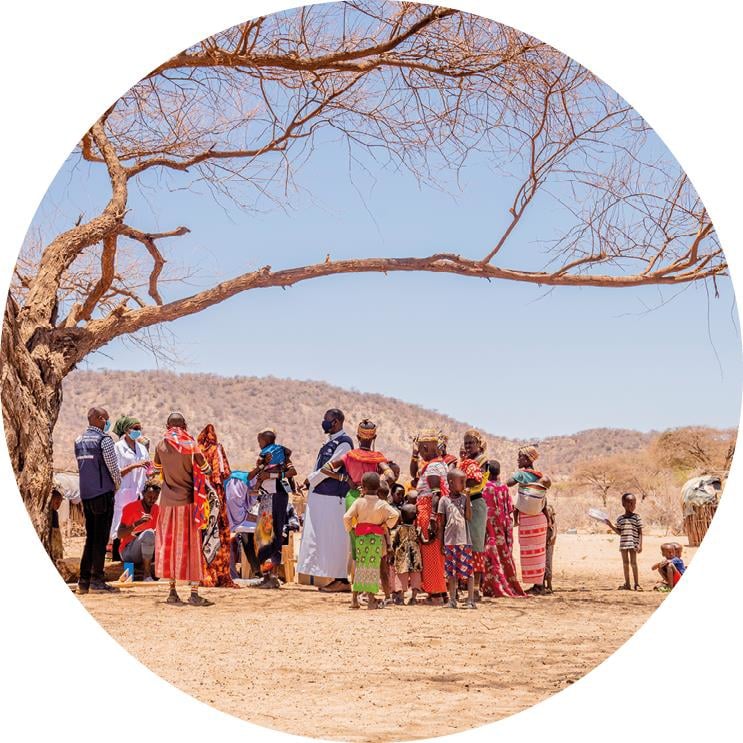
A nutrition screening activity by a mobile health team, Kenya
Photo: WHO / Billy Miaron
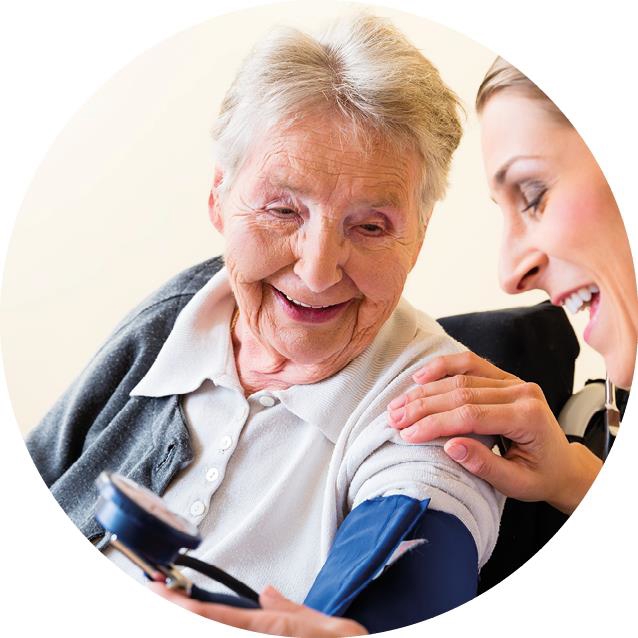
Measuring blood pressure
Photo: Colourbox
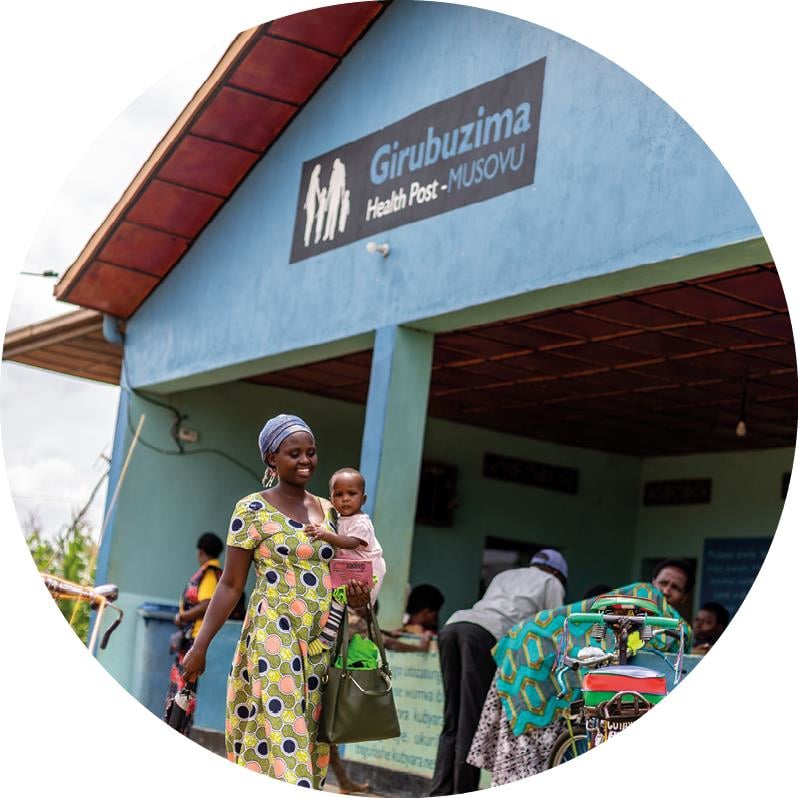
Attending Primary Health Care Center in Rwanda
Photo: WHO / Isaac Rudakubana
2.2.2 Priorities
Contribute to more coordinated, sustainable and country-led efforts for UHC
To achieve UHC, Norway’s efforts will go towards prioritising PHC, with the integration of services such as prevention and treatment of communicable and non-communicable diseases, mental health and sexual- and reproductive health and rights. It is also important to consider negative effects of climate change, changes in the environment and in nature. These includes, among others, rise in climate-related diseases and damage, changes in type, prevalence and spread of infectious diseases as well as antimicrobial resistance.
Norway is working towards better coordination of long-term development and humanitarian assistance, and for peace and reconciliation efforts to be made in acute humanitarian crises. It is important to support national efforts to achieve UHC and strengthen health systems, taking into account the varying contexts in different countries. Norway is working to promote the Lusaka Agenda to improve coordination among global actors on countries’ UHC plans.
As a member of the WHO Executive Board, Norway will:
- Support efforts to develop and implement integrated national health plans and budgets to achieve UHC. Plans should be developed with transparent, inclusive, and fair decision-making processes 8 .
- Reinforce the WHO’s technical and normative role in supporting countries in the development of one national integrated health plan.
- Work to improve coordination of global actors’ actions to support countries’ plans for UHC and stronger health systems, in line with the Lusaka Agenda 9 .
- Promote cross-sectoral preventative measures and integrated service delivery, with an emphasis on PHC services.
- Promote the provision of essential health services free of charge or at an affordable price for all. Public health financing models should be strengthened, preferably through progressive tax systems that reduce inequity, including through fiscal policies for health.
- Call for to the need to strengthen international mechanisms for monitoring and holding national authorities and other central actors to account, for example through a joint international reporting system for UHC and health system strengthening, and through systems to prevent corruption.
- Support WHO’s knowledge generation about the health consequences of climate change, about climate-adaptation through more robust and resilient health systems, and to support WHO’s efforts to reduce the environmental impact of, and emissions from, the health sector.
- Ensure that attention is given to the specific challenges of countries/regions in crisis, and that their voices and needs are included in relevant processes.
Promote the WHO’s leadership and agenda on health personnel
Realizing the right to health and increasing health service coverage depend on sufficient, qualified and available health personnel, who have good and safe working conditions. Health personnel are crucial to building robust and climate-resilient health systems that can continue to function in times of crisis. There is a global shortage of health workers, especially in low- and middle-income countries, but countries in all stages of development are experiencing challenges in training, recruitment, deployment, retention and performance of personnel 10 .As a member of the Executive Board, Norway will:
- Support the WHO’s Global Strategy on Human Resources for Health: Workforce 2030 and WHO’s Action Plan for Health and Care Personnel (in collaboration with the ILO and OECD), «Working for Health», which aims to strengthen the health personnel agenda in line with resolution WHA75.17 11 . Including Human resources for health:
- Communicate the importance of optimising resource use: promote measures for good management, including planning, education, training and recruitment, good registries for health personnel, optimise management, facilitate appropriate task shifting and skills mix, and the retention of personnel through among others, development opportunities and good working conditions.
- Contribute to ensure that the WHO’s Global Code of Practice on International Recruitment of Health Personnel remains relevant and effective.

Health workers
Photo: Colourbox
Strengthen WHO’s role in improving access to essential medicines and vaccines
Countries face several barriers to delivering universal access to safe, effective, and quality medicines. Although the situation is complex, lack of access, rooted in vulnerabilities and dependencies in global value chains and high prices, poses major challenges in most countries. The danger of rising levels of counterfeit medicines in supply chains is another major challenge in many countries 12 .
As a member of the Executive Board, Norway will:
- Support the WHO’s efforts to ensure access to essential medicines and other health products in all countries.
- Support the implementation of resolution WHA72.8 – Improving the transparency of markets for medicines, vaccines and other health products 13 .
- Share experiences from the Oslo Medicines Initiative (OMI) with the WHO globally, in relation to measuring access to medicines, joint negotiations/procurement and improved transparency.
- Help to strengthen local and regional production of medicines and promote the WHO’s role in regulatory systems for medicines, including vaccines and other health products.
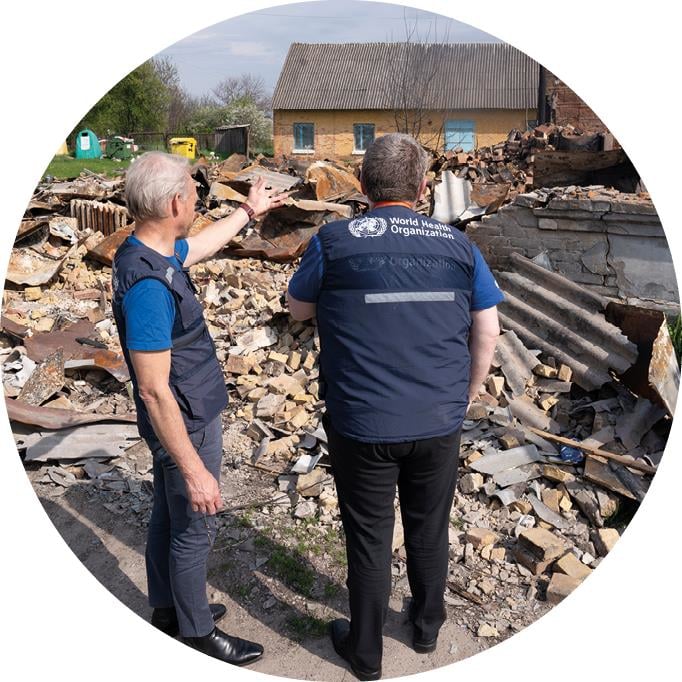
Outbuilding of the Damaged Makariv District Hospital in Ukraine
Photo: WHO / Christopher Black

Woman, computer and face mask in science laboratory
Photo: Colourbox
2.3 Better preparedness and response to health and humanitarian crisis
Aims and objectives: Strengthen global efforts on infectious disease outbreaks including pandemics and ensure access to essential health services in humanitarian crises.
2.3.1 Background
The COVID-19 pandemic revealed a shared global vulnerability to pandemics and the obvious need for international cooperation. Climate change, urbanisation, growing antimicrobial resistance and a number of other factors are increasing the risk of new pandemics.
The responsibility for safeguarding national health preparedness rests with national authorities. Individual countries are nevertheless dependent on circumstances in other countries, the willingness for multilateral cooperation, international systems and global public goods. There is a diverse global landscape of actors in health preparedness. From its position as a normative, leadership and coordinating organisation, WHO plays a vital role in ensuring that countries, WHO, and other actors have the necessary technical knowledge to be able to prevent and manage health crises within their respective mandates as efficiently as possible, and in a coordinated way.
The WHO is an important operational actor in health and other humanitarian crises. There is a pressing need to improve the ability of countries, and the international community, to prevent and manage outbreaks of infectious diseases and avoid future pandemics. When health crises occur, it is the day-to-day health services that are responsible for dealing with them. Good public health functions, a robust health service, and health authorities that have the trust of their societies are central to a country’s health preparedness. The White Paper to the Norwegian parliament, «Resilient health preparedness – from pandemic to war in Europe» 14 , provides political and strategic direction for Norwegian health preparedness. Norway’s general position is that health preparedness is integral to improving health systems and governance nationally.
Alongside the increased risk of pandemics, humanitarian needs have risen dramatically over the past decade. The UN now estimates that around a quarter of the world’s population is living in areas of conflict. The UN High Commissioner for Refugees estimates that 130 million people will be forced to flee within their own countries or across national borders in 2024. This also increases the pressure on health preparedness and response to health crises and underscores the importance of establishing robust health services that can handle different types of disasters. Suggest different placement of commas: Preventing and being prepared for health emergencies, as well as dealing with the health consequences of complex humanitarian crises, is a key Norwegian priority. Both acute and long-term health crises have grown in their complexity, and can have broad social, economic and developmental consequences. Although national authorities and health actors have primary responsibility during humanitarian crises, these situations often involve significant support from the international community.
Norwegian humanitarian policy is a central component of foreign policy, and focuses on saving lives, relieving suffering and safeguarding people’s dignity and rights in humanitarian crisis 15 . This approach takes the form of providing emergency aid and other measures to protect those affected by crises. In times of crisis, health is a major concern. The WHO is an important partner in such situations and plays a particularly important role through its normative function and its work with other development and humanitarian actors. During its term on the Executive Board, Norway will work to ensure that the WHO’s humanitarian efforts are comprehensive, focusing on effective disease prevention, notification, preparedness, and crisis management within the organisation and in the countries it assists.

Personell wearing hazardous materials suit and facemask
Photo: Colourbox
2.3.2 Priorities
Support measures to strengthen international cooperation
The COVID-19 pandemic demonstrated that the existing international coordination of actors in health crises was inadequate, including in terms of providing access to medical countermeasures. To collectively strengthen global health preparedness and health security, all Member States must be better able to respond to pandemics and infectious disease outbreaks. As a recognition of this, several processes were initiated.
The Pandemic fund was established to improve Member States’ access to financial support for pandemic prevention, preparedness and response.
The International Health Regulations (IHR 2005) establishes a legally binding framework for how Member States and WHO must work together to prevent international spread of disease. In the wake of the pandemic, Member States agreed on targeted amendments to the IHR 2005. At the time of writing, negotiations on a new pandemic agreement are also ongoing.
Norway fully supports these efforts to strengthen pandemic prevention, preparedness and response, including the ability of Member States to prevent, detect, notify and combat infectious diseases before they develop into pandemics – as well as to ensure more equitable access to medical countermeasures during pandemics. This is also vital for improving WHO’s ability to support its Member States, in collaboration with other relevant actors. Employing the lessons learned from The Access to Covid-19 Tools Accelerator, which was co-chaired by Norway and South Africa during Covid-19, is part of this endeavour.

Vaccination
Photo: Colourbox
As member of the Executive Board, Norway will:
- Be a driving force for and contribute to finalizing the negotiations on the pandemic agreement. We will also contribute to establishing effective accountability for implementation of the pandemic agreement as well as for the revised IHR (2005).
- Work to ensure that the experiences from the COVID-19 pandemic are used to strengthen international cooperation and the coordination of health preparedness and crisis response with WHO and relevant global health actors, civil society, the private sector, as well as other actors. This includes support processes for the establishment of a platform for medical countermeasures, coordinated by WHO.
- Support WHO’s ability to fulfil its mandate and its coordinating role in the global health landscape. Follow-up of the Lusaka Agenda is central in this regard. Norway will pursue a coordinated policy for global health and health preparedness across arenas.
Apply a One Health approach
Climate change, urbanisation, population growth, travel and increased global migration are some of the contributing causes for outbreaks and spread of infectious diseases. These factors also increase the potential for pandemics and the vulnerability of populations. The most likely origin of pandemics is animal to human transmission. To monitor potential pandemic threats and prevent outbreaks, One Health collaboration, across the health of people, animals and the environment, is essential. Cooperation on integrated monitoring, knowledge-sharing, and normative work is key. To this end, the WHO, the UN Food and Agriculture Organization (FAO), the World Organization for Animal Health (WOAH), and the UN Environment Programme (UNEP) have established what is known as the quadripartite collaboration for One Health.
As a member of the Executive Board, Norway will:
- Be a driving force for that the One Health approach should be integrated at all levels of society, and that it should be seen as part of a cross-sectoral strategy. This is important for improving the prevention and monitoring of diseases with pandemic potential.
Accelerate action to address AMR
The One-Health approach is also fundamental to the containment of antimicrobial resistance (AMR). AMR is no longer a «silent pandemic», but claims millions of lives every year, and the threat is growing. There is an urgent need to step up efforts against antimicrobial resistance through infection prevention and control (IPC), clean water, sanitation and hygiene (WASH), access to antimicrobials, more responsible use of medicines for people and animals, reducing the use of pesticides that contribute to AMR, development and availability of vaccines, and development of new antimicrobial drugs. Better awareness and responsible practice in health services, in addition to improved access to effective antimicrobial drugs, is also needed globally, and especially in low- and middle-income countries. The high-level meeting on AMR at the UN General Assembly in September 2024 resulted in a declaration that set targets for countries, and recommended actions for Member States and the UN organisations that form the Quadripartite, including WHO.
As a member of the Executive Board, Norway will:
- Support efforts to combat AMR by improving disease prevention, using antibiotics responsibly, and through innovation, in addition to improving global access and mutual accountability for implementation.
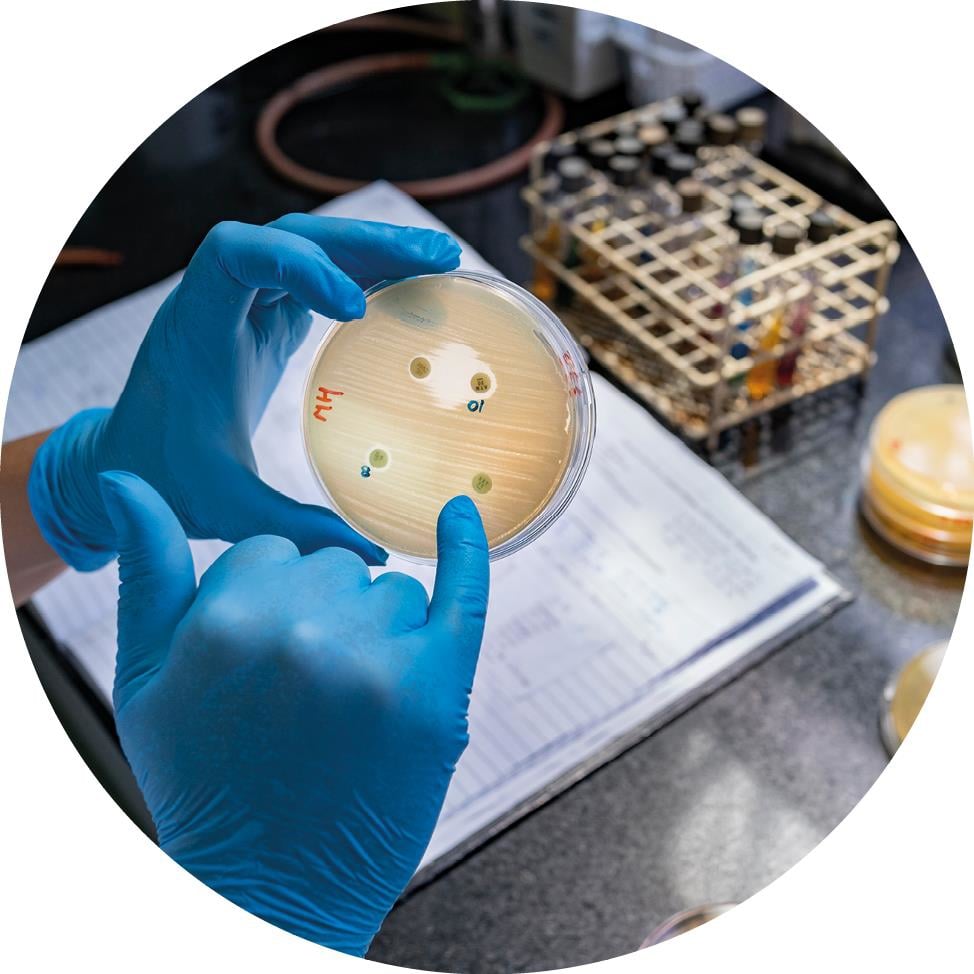
Antimicrobial Resistance (AMR) Surveillance
Photo: WHO / Sarah Pabst
Address the knowledge-gap on non-pharmacological infection control measures
To limit outbreaks of infectious diseases, sound evidence on the effects of non-pharmacological infection control measures is needed. Measures such as social distancing at work and in leisure activities, closing of schools, kindergartens, dining establishments and cultural events, regulation of border crossings and other forms of lockdown can be effective and necessary to limit the spread. This applies in particular to diseases where pharmacological countermeasures do not yet exist or are not effective enough. However, such measures can also have significant negative consequences. The evidence base on the positive and negative effects of such measures is limited. Expanding this field of knowledge is key to being able to manage outbreaks with the least possible disruption to society, and to build trust in the authorities responsible for handling the situation.
As a member of the Executive Board, Norway will:
- Continue to lead efforts to strengthen the evidence base on non-pharmacological Public Health and Social Measures (PHSM) to ensure that the WHO, as a normative body, takes special responsibility.
Support WHO’s humanitarian efforts
In humanitarian crisis situations, the nature of the disaster determines how national and international humanitarian efforts are organised and carried out. The WHO has certain responsibilities in the context of global, regional and local health crises, alongside health service providers. All humanitarian efforts are based on rights. The WHO, through its partners and in coordination with other actors, delivers various forms of emergency services, focusing in particular on vulnerable groups and their needs. The WHO also has an important role in pointing out to authorities and parties in the conflict their obligations in protecting the civilian population, including patients and health personnel. The WHO is an important voice in calling to attention violations of international humanitarian law such as attacks on health facilities. Norway does the same through channels for humanitarian diplomacy.
As a member of the Executive Board, Norway will:
- Actively support the WHO’s leadership in defending humanitarian law in situations involving attacks on health facilities, personnel and patients 16 .
- Ensure sufficient political support and resources so that life-saving health services remain central to the WHO’s humanitarian efforts, and that acute crises are met with a rapid and effective response, in accordance with the WHO’s Health Emergency Programme (WHE), various emergency aid appeals and established crisis management systems.
- Support the WHO’s and partners’ requirements for humanitarian access to people in need in certain particularly acute crises.
- Ensure that topics such as sexual- and reproductive health and rights, mental health and psychosocial support are given priority in humanitarian crises and as part of long-term development efforts.
- Ensure that health services take into account marginalised people and especially vulnerable groups in humanitarian crises, including refugees/internally displaced persons, children/young people, women, the elderly, people with disabilities and minority groups.
- Ensure that survivors of sexual and gender-based violence, regardless of gender, are prioritised during and after humanitarian crises, including by fighting stigma and discrimination.
- Monitor the WHO’s role at country level, through reports and the negotiation of resolutions on specific humanitarian crises. In cases involving complex contexts, ensure that Norwegian foreign policy considerations are taken into account.